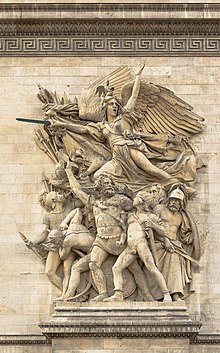La Marseillaise

The Marseillais volunteers departing, sculpted on the
Arc de Triomphe |
|
|
National anthem of |
|
| Also known as | Chant de Guerre pour l'Armée du Rhin |
|---|---|
| Lyrics | Claude Joseph Rouget de Lisle, 1792 |
| Music | Claude Joseph Rouget de Lisle |
| Adopted | 1795 |
| Music sample | |
|
|
|
"La Marseillaise" (French pronunciation: [la maʁsɛjɛːz]) is the national anthem of France. The song was written in 1792 by Claude Joseph Rouget de Lisle in Strasbourg after the declaration of war by France against Austria, and was originally titled "Chant de guerre pour l'Armée du Rhin" ("War Song for the Rhine Army").
The Marseillaise was a revolutionary song, an anthem to freedom, a patriotic call to mobilize all the citizens and an exhortation to fight against tyranny and foreign invasion. The French National Convention adopted it as the Republic's anthem in 1795. It acquired its nickname after being sung in Paris by volunteers from Marseille marching to the capital. The song is the first example of the "European march" anthemic style. The anthem's evocative melody and lyrics have led to its widespread use as a song of revolution and its incorporation into many pieces of classical and popular music.
As the French Revolution continued, the monarchies of Europe became concerned that revolutionary fervor would spread to their countries. The War of the First Coalition was an effort to stop the revolution, or at least contain it to France. Initially, the French army did not distinguish itself, and Coalition armies invaded France. On 25 April 1792, baron Philippe-Frédéric de Dietrich, the mayor of Strasbourg, requested his guest Rouget de Lisle compose a song "that will rally our soldiers from all over to defend their homeland that is under threat". That evening, Rouget de Lisle wrote "Chant de guerre pour l'Armée du Rhin" (English: "War Song for the Army of the Rhine"), and dedicated the song to Marshal Nicolas Luckner, a Bavarian in French service from Cham. A plaque on the building on Place Broglie where De Dietrich's house once stood commemorates the event.
...
Wikipedia
